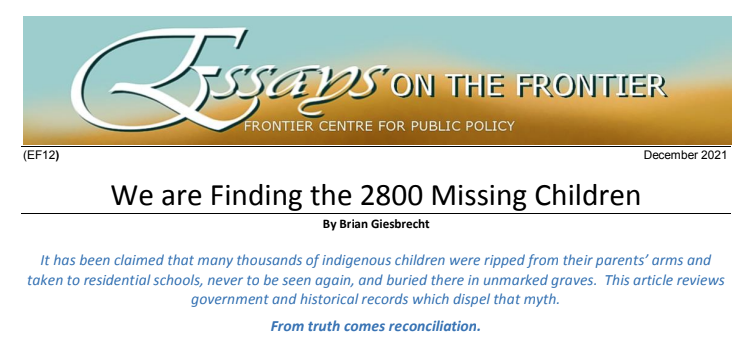The age-old expression that actions speak louder than words conveys an important insight: character is best judged through action. Anyone can say or promise anything but doing requires ability and skill, discipline and commitment. So, the simplest test of character is...
Results for "Residential"
We are Finding the 2800 Missing Children
The “secret graves” and “missing children” narrative had our national flag flying at half-mast for over five months after an obscure indigenous politician made the startling claim that she “knew” that 215 indigenous children had been secretly buried in the “apple...
When People You Trust Lie, You Believe
Consider how you might feel if you were in the same room as an Antifa activist who had shot dead two people during a violent riot. Important context aside, just knowing that this radical activist had killed two people with a weapon in the street would likely be enough...
How Bernays Changed the World Through PR
Edward Bernays (1891-1995) changed the world in ways that are still felt today. The nephew of Sigmund Freud was dubbed the Father of Spin and the Father of Public Relations for pioneering breakthroughs in his craft. A close examination of his accomplishments could...
Featured News
Interest Rates do not Merely Parallel Inflation Upward—the Inflation Risk Premium can Escalate too
It is not entirely clear whether the Canadian and the global economies are heading for a new inflationary era. It may turn out that inflation is not only elevated from recent negligible levels, but escalates, steadily at first, and then dramatically, as it did in the...
CUSMA the New NAFTA: Boon or Bane For Canada?
In 1994, the United States, Mexico and Canada created a free-trade region with the North American Free Trade Agreement (NAFTA). Considering the fact that the USA is the largest economy in the world (from 1994 to present), NAFTA was a true asset for the Canadian...
Interlake Water Woes
Over the last few years of wet weather, the Shoal Lakes have been expanding and flooding surrounding lands.
The lakes only need to rise 30 or 40 centimetres higher before they spill into Grassmere Drain, with unknown and potentially disastrous effects on downstream agricultural and residential communities, said Steve Topping, executive director of Manitoba Water Stewardship.
Australia’s Carbon Warning for Obama: It turns out emissions restrictions do not grow more popular the more you try to pitch them..
President Obama’s Environmental Protection Agency is fighting a rear-guard action to accomplish via regulation what voters rejected via Congress: ruinously expensive restrictions on carbon emissions in the name of fighting “global warming.” But before he goes much further down that road, he should take a look at how a similar political calculation is playing out in Australia. In short, not well.
UBB Costing – Guest Post
The following is a Guest Post submitted by Roland Renner.
UBB for Internet Access – The Need for Cost Analysis, Technology Considerations and Service Definitions
The first reaction of many people to the idea of usage based billing is intuitively positive. People should pay for what they use. This seems perfectly fair and reasonable. Specific implementations, however, require cost analysis, and a hard look at technology choices and service definitions. Only then is it possible to determine if a UBB scheme will help to use resources effectively.
Network services like power and telecoms are provisioned for peak usage. Customers who require service at the peak times are therefore responsible for the highest cost. It is usage at the system peak that is the key cost driver of capacity requirements, not just usage alone. Specific applications of usage based billing, however, do not necessarily reflect the underlying cost drivers.
Another key factor to consider is the time horizon and the technology environment. Are we dealing with the short term or over several years when we need to consider replacement of current plant? Are we dealing in a technologically stable environment or one of rapid change?
Smart Grids – Adam Smith or Orwell?
A quick scan of blogs and media coverage of Smart Grids for electricity quickly reveals a fear of a system that could have been envisaged by Orwell. Fears of big brother type of systems are given voice by many, including Lawrence Solomon at the National Post.
Under the so-called “smart grid” that the UK is developing, the government-regulated utility will be able to decide when and where power should be delivered, to ensure that it meets the highest social purpose. Governments may, for example, decide that the needs of key industries take precedence over others, or that the needs of industry trump that of residential consumers. Governments would also be able to price power prohibitively if it is used for non-essential purposes.
Leveling the playing field when developing off-reserve band lands
One of the most crucial elements is the signing of a municipal services agreement which includes tax loss compensation. This is to offset the tax exempt status of the reserves commercial and real estate holdings.
A “Peak” at an Example of a Smart Grid System
Smart Grids for electrical utilities offer the potential to transform how electricity is produced, transmitted and consumed. In some respects, it represents a comparable type of change to what the Internet introduced into traditional switched circuit voice networks and point-to-point host-terminal computing systems. By linking users, producers and transmission operators into a dynamic and interactive network, Smart Grids offer the potential to increase the utilization of generating assets and create a platform that can introduce real-time competition into all parts of the energy markets.
The Globe and Mail has published an article that provides one illustrative example of how a Smart Grid application can and does work to improve the operations of power networks.
Manitoba Hydro: Reforming the Jurassic Crown (Part 7 of 8)
Manitoba Hydro needs a full mandate review and governance overhaul if it is to serve the people of Manitoba and become the engine of economic growth it ought to be.
Reaganomics: What We Learned: From December 1982 to June 1990, Reaganomics created over 21 million jobs. The right policies can do it again
For 16 years prior to Ronald Reagan’s presidency, the U.S. economy was in a tailspin—a result of bipartisan ignorance that resulted in tax increases, dollar devaluations, wage and price controls, minimum-wage hikes, misguided spending, pandering to unions, protectionist measures and other policy mistakes.
Foreign Investment is No Panacea
Terrence Corcoran take the government to task today in an article at the Financial Post. He asserts that the government has muddled their priorities when it comes to promoting competition before liberalizing rules governing foreign investment.
The future promises at least another decade of tangled policy, court battles and regulatory chaos — and delayed innovation. No other outcome is possible so long as the government intends to set the policy agenda exactly backward. The plan, as frequently outlined by Industry Minister Tony Clement, is to first get all the spectrum allocated and settle all the competition issues, including installing a range of competing companies. Only then will the government look at changing foreign-ownership regulations.



